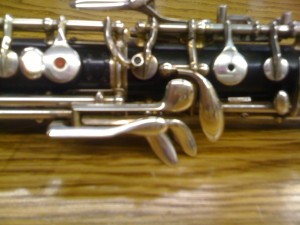Post 2: Sticky 1st Octave Pad
There are many reasons your 1st octave pad could be sticking. There are mechanical problems like the key binding on the rod, which means the key will feel tight between the posts or tight on the rod. To remedy these types of problems I will refer you to your favorite oboe repair person.
Your 1st octave pad may also stick due to a deep indention in the pad surface. Since the cork pad is a much softer material than the metal octave vent that the pad rests on, the pad will form an indention. Over time that indention will get deeper and deeper, and eventually start sticking to the octave vent. Unfortunately, if this is the problem you are having you will probably not be able to fix this yourself. The only real solution is to see your favorite oboe repair person and have the pad replaced.
There are times when the pad sticks because the pad seat gets dirty. This is caused over time by the pad getting wet from your saliva. Not only is your saliva wet, but it can also contain sugars from eating and/or drinking and once the pad is wet, dust particles settle in on the surface of the pad. Over time this process repeats itself. Then, one day, voila! – your pad starts sticking. You can try to clean the pad by placing a clean paper towel under the pad, lightly press down on the key and pull the towel out. This process will pull some of the stickiness off of the pad and make it less sticky. You may need to repeat this process a couple times, but just keep in mind the pad will start sticking again. (Cigarette paper could also be used instead of a paper towel.)
To help reduce stickiness due to moisture and saliva, always rinse your mouth out with water before playing your oboe. Or even better, brush your teeth before playing followed by rinsing really well. Brushing your teeth and rinsing your mouth will reduce the unwanted sugars from entering your oboe.
To help prevent your octave pads from getting deep indention’s in them, watch how you assemble your oboe. Do not squeeze any keys when you assemble your oboe by holding your upper joint at the very top on the crown. I have also seen people place a piece of cigarette paper under the octave pads when the oboe is not in use. Doing so will reduce some of the direct pressure the pad receives from the metal octave vent.
You will hear me say a lot, “The best maintenance is preventative maintenance!” Have your oboe serviced by your favorite oboe repair person at least once a year, and you will most likely NOT find yourself in a sticky situation.
Post 1: Be careful of your low B and Bb levers.
When laying your oboe down be careful not to lay it on the left-hand side with your low B and Bb levers. Doing so can possibly bend the levers and will make your low B and Bb out of adjustment. This picture is an example of what NOT to do…

